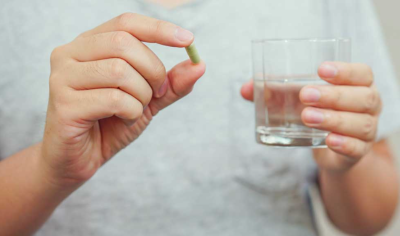What is ashwagandha?: Everything you need to know

People are turning to complementary therapies more than ever these days. In fact, around 9 million people are thought to make use of varying wellbeing and health-enhancing techniques to manage their chronic illnesses.
‘Herbal medicines are those with active ingredients made from plant parts, such as leaves, roots or flowers,’ states the NHS' complementary therapies resource. That’s where ashwagandha comes in.
With more people googling, purchasing and using ashwagandha, we have created a cheat sheet for if you want to, or are interested in, trying the herbal therapy safely.
What is ashwagandha?
Ashwagandha is one of the most important herbs of Ayurveda (the traditional system of medicine in India). Also known as Indian Ginseng, the plant's root is often used as a health supplement.
The herb is classified as an adaptogen, meaning it can relieve stress and anxiety.
In a 2019 study, Australian researchers investigated the effects of ashwagandha on 60 people. The cohort was split into two groups, half were supplementing with the herb whilst the others were placed on a placebo. Over 60 days, people who were using the herb saw an average 41% reduction in anxiety levels.
How does ashwagandha work?
Any active ingredient has an effect on the chemicals in your body, and ashwagandha is no different. So, if you are thinking of supplementing with it, you should check with your doctor to see if it fits into your health plan and won’t conflict with existing medications.
It’s widely thought that the chemical sitoindosides present in the herb are the reason why it makes people relax.
When should I take ashwagandha?
Most people choose to take ashwagandha in a capsule as part of their evening routine. This is not down to feeling relaxed straight away, it’s because some people report stomach issues when taking the herb. So, it’s better to take on a full stomach.
As mentioned, the time at which you choose to consume the herb will not affect how quickly you see results. In the medical science journal Cureus, one report on the performance of ashwagandha for insomnia shows that it takes an average of 10 weeks for people to reap the benefits of the complementary therapy.
How much ashwagandha should I take?
Most studies show that 500–600 mg of ashwagandha per day is the best dose for feeling more relaxed or sorting your sleep. As with any supplement, you are more likely to reap the benefits after four to six weeks of taking the herb.
Once you hit this milestone, check in with how you are feeling and if the supplement has made a difference. Keeping a sleep or stress diary is a handy tool for this.
What else is ashwagandha good for?
A 2013 study in the Indian Journal of Pharmacology found that taking ashwagandha can reduce blood sugar levels in healthy people and people with diabetes. The four-week trial showed that daily supplementation reduced fasting blood sugar levels three times more than a placebo.
If you are interested in learning more about your health, check out our articles page for regular health news and updates!
Information contained in this Articles page has been written by talkhealth based on available medical evidence. The content however should never be considered a substitute for medical advice. You should always seek medical advice before changing your treatment routine. talkhealth does not endorse any specific products, brands or treatments.
Information written by the talkhealth team
Last revised: 29 November 2022
Next review: 29 November 2025
